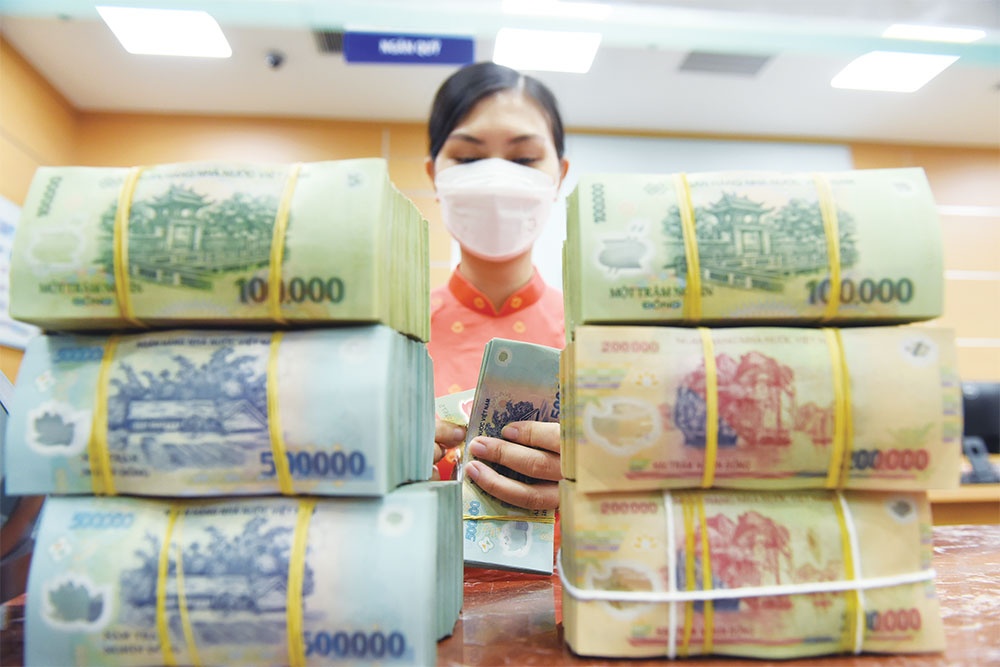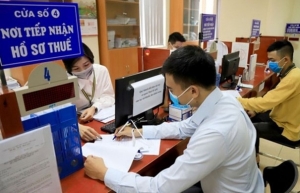State budget pressures persist in spite of revenue momentum
Latest figures from the General Statistics Office (GSO) showed that in the first nine months of this year, the Vietnamese economy enjoyed a budget surplus of $10.6 billion, with the economy climbing by an impressive rate of 8.83 per cent on-year.
 |
| State budget pressures persist in spite of revenue momentum, Photo: Le Toan |
In September the state budget saw a total spending sum of an estimated $5.77 billion, lifting the 9-month expenditure total to about $47.21 billion – up 5.4 per cent on-year. Recurrent expenditure for the nine months reached nearly $33 billion – up 4.6 per cent; spending for development investment hit $11 billion – up 15.8 per cent; and expenditure for debt service – down 9.1 per cent.
“The 5.4 per cent rise in spending has helped ensure capital for socioeconomic development demand, national defence and security, state management, and payment for debts that become due,” said GSO general director Nguyen Thi Huong.
In September, state budget revenues were estimated at $4.12 billion, raising the 9-month total to about $57.83 billion, up 22 per cent as compared to the same period last year.
All types of revenues for the state budget have increased significantly, reflecting the economy bouncing back in a relatively comprehensive manner, said Huong.
Specifically, domestic revenue in September is estimated to be $3.1 billion, raising the 9-month figure to around $45.48 billion – up 18.8 per cent on-year. Meanwhile, revenue from crude oil exports in September is estimated to stand at $304.35 million – helping to create a 9-month figure of about $2.61 billion – doubling the annual estimates and up 103.5 per cent as compared to the corresponding period last year.
In addition, revenues from export-import turnover in September were estimated to sit at $717.4 million, helping to bring the 9-month figure to $9.41 billion – equal to 108.8 per cent of the annual estimates and up 22.1 per cent on-year.
However, according to the Ministry of Finance, the 9-month budget surplus does not mean a bright picture in the state budget overall this year as enormous challenges remain ahead.
In fact, one year ago, the government set out a budget deficit for the entire year of $16.21 billion or 4 per cent of GDP due to forecasts of an increase in expenditures for socioeconomic development and a reduction in revenues. This was expected due to difficulties in production and business activities through the pandemic.
The government set a target that this year, the total revenues will likely be nearly $61.4 billion, up 3.4 per cent on-year, and the total expenditure is estimated to be nearly $77.6 billion, up 4.5 per cent on-year.
However, expecting that the the economy may face more difficulties, the National Assembly (NA) in February approved a plan on raising the state budget deficit in 2022 and 2023 by an annual average rate of 1-1.2 per cent of GDP, with a maximum permitted sum of $10.43 billion.
In which, the rate will be 1.1 per cent of GDP this year, with a maximum amount of $4.47 billion. The government will formulate the state budget planning for 2023 which will be submitted to the NA for consideration and approval.
This scheme is part of the NA’s huge monetary and fiscal policy worth $15 billion in service of the country’s Programme on Socioeconomic Recovery and Development for the 2022-2023 period.
The scheme is also set to help boost business and production activities which will drive the economy to an average 6.5-7 per cent growth rate for 2021-2025, after the economy rose merely 2.58 per cent last year.
Last week, Prime Minister Pham Minh Chinh ordered that the Ministry of Finance, combined with ministries and relevant agencies, review and continue reducing taxes and fees, and enact suitable policies to support people and enterprises so that they can continue recovery. The new move is expected to reduce revenues for the state, but once such activities are resumed and developed strongly, enterprises’ contributions to the state will also increase.
PM Chinh also ordered the continuation of effective control of the state budget. The government has been implementing a policy of intensifying more examinations and inspections, and strictly punishing all violators of state budget management. The inspections will be focused on some key sectors including management of land, natural resources and minerals, public investment, management and use of public assets, and equitisation of state-owned enterprises.
In June, the National Assembly Economic Committee also noted that there will be strengthened management of the fight against transfer pricing, tax evasion, and trade fraud. The government and the NA have also required ministries, agencies, and localities to implement schemes for reviewing state funding, so as to gather the money for economic recovery and development activities.
At least half of the costs for conferences and trips abroad by ministries, central agencies, and localities must be decreased, except for costs for fighting the pandemic and implementing diplomatic activities. No more money is provided for unnecessary activities as it is deemed necessary to further strengthen financial and state budget discipline, with radical thrift in recurrent spending.
 | Tax system reform strategy to 2030 approved Deputy Prime Minister Le Minh Khai has approved reforms to the tax system. |
 | Rising state budget revenues point to business confidence Amid a state budget surplus, a positive trade landscape, and a climb in disbursement and addition of foreign direct investment so far this year, the Vietnamese economy is expected to record a current account surplus for 2022. |
What the stars mean:
★ Poor ★ ★ Promising ★★★ Good ★★★★ Very good ★★★★★ Exceptional
Related Contents
Latest News
More News
- Banking sector targets double-digit growth (February 23, 2026 | 09:00)
- Private capital funds as cornerstone of IFC plans (February 20, 2026 | 14:38)
- Priorities for building credibility and momentum within Vietnamese IFCs (February 20, 2026 | 14:29)
- How Hong Kong can bridge critical financial centre gaps (February 20, 2026 | 14:22)
- All global experiences useful for Vietnam’s international financial hub (February 20, 2026 | 14:16)
- Raised ties reaffirm strategic trust (February 20, 2026 | 14:06)
- Sustained growth can translate into income gains (February 19, 2026 | 18:55)
- The vision to maintain a stable monetary policy (February 19, 2026 | 08:50)
- Banking sector faces data governance hurdles in AI transition (February 19, 2026 | 08:00)
- AI leading to shift in banking roles (February 18, 2026 | 19:54)

 Tag:
Tag:



















 Mobile Version
Mobile Version